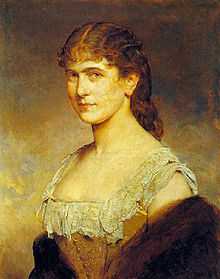Katharina Schratt
| Katharina Schratt | |
|---|---|
|
Katharina Schratt | |
| Born |
11 September 1853 Baden bei Wien, Austria–Hungary |
| Died |
17 April 1940 (aged 86) Vienna, Nazi Germany |
| Occupation | Actress |
| Years active | 1871–1900 |
| Spouse(s) |
Nikolaus Kiss de Ittebe (1879–1909) |
Katharina Schratt (11 September 1853 in Baden bei Wien, Austria – 17 April 1940 in Vienna) was an Austrian actress who became "the uncrowned Empress of Austria" as a confidante of Emperor Franz Joseph.
Early life and marriage
Katharina Schratt was the only daughter of an Office supplies dealer; she had two brothers. At the age of 6, she took an interest in theater. Her parents' efforts to discourage this only increased her ambition. She married Hungarian aristocratic Nikolaus Kiss de Ittebe in 1879, and gave birth to a son, Anton, in 1880. Schratt and her husband separated due to incompatibility.[1]
Acting career
At the age of 18, she appeared with the Hoftheater in Berlin, achieving considerable success in a short time. Schratt left Germany after only a few months, following the call of the Viennese to join their city's theater. Her performance made her a leading lady of the Viennese stage.[2] She toured overseas, and appeared in New York after which she returned permanently to Vienna's Hofburgtheater, she was one of Austria's most popular actresses until she retired in 1900.[3]
Royal friend and confidante
Schratt's appearances and performances in the early 1880s at Hofburgtheater captivated Franz Joseph,[4] and she was invited to perform for visiting Czar Alexander III of Russia. She soon became Franz Joseph's companion. It is said that Franz Joseph's wife Empress Elisabeth actually promoted the relationship between the actress and the Emperor.[5][6] After Elisabeth's murder in 1898, their relationship continued, with one interruption (1900/01, due to a difference in opinions), until his death in November 1916. She was rewarded with a generous lifestyle including a mansion on Vienna's Gloriettegasse, near the Schönbrunn Palace, and a three-story palace on the Kärntner Ring, just across from the Vienna State Opera. In addition, her gambling debts were paid by him.[7][8] Schratt's relationship with the Emperor lasted for 34 years, but remained platonic.[9]
Later life and death
After the death of Franz Joseph, she lived completely withdrawn in her palace on the Kärntner Ring. In the 1930s, journalists bothered her to talk about her relationship with the late Emperor. Book companies asked her to write her memoirs, however Schratt would always say, "I am an actress not a writer and I have nothing to say, for I was never a Pompadour, still less a Maintenon."[10] In her later years, Schratt became deeply religious. She died in 1940 at the age of 86. She was buried at Hietzinger Cemetery in Vienna.
References
- ↑ Murad, Antol (1968). Franz Joseph I of Austria and His Empire. Empress Elizabeth: Irvington Pub; First Edition. p. 115. ISBN 0829001727.
- ↑ Bradley, p. 131
- ↑ Merkle, Ludwig (2003). Sissi, the tragic empress: the story of Elisabeth of Austria. Stiebner Verlag GmbH. p. 97. ISBN 978-3830708308.
- ↑ Bradley, Ian C (2010). Water music: music making in the spas of Europe and North America. Oxford University Press. p. 131. ISBN 0195327349.
- ↑ Merkle, Ludwig (2003). Sissi, the tragic empress: the story of Elisabeth of Austria. Stiebner Verlag GmbH. pp. 97–98. ISBN 978-3830708308.
- ↑ Murad, Antol (1968). Franz Joseph I of Austria and His Empire. Empress Elizabeth: Irvington Pub; First Edition. p. 114. ISBN 0829001727.
- ↑ Merkle, p. 97
- ↑ Herman, Eleanor (2005). Sex with Kings: 500 Years of Adultery, Power, Rivalry, and Revenge. p. 143.
- ↑ Morton, Frederic (1989). Thunder at Twilight: Vienna 1913/1914. pp. 85–86.
- ↑ Herman, Eleanor (2005). Sex with Kings: 500 Years of Adultery, Power, Rivalry, and Revenge (P.S.). William Morrow Paperbacks. p. 208. ISBN 0060585447.
Further reading
- Joan Haslip, The Emperor & the Actress: The Love Story of Emperor Franz Josef & Katharina Schratt (Dial Press, 1982)
- Georg Markus, Katharina Schratt: Die zweite Frau des Kaisers (Amalthea, 2004)
- B. Hamann, Meine liebe, gute Freundin! Die Briefe Kaiser Franz Josephs an K. Schratt (Amalthea 1992)
- Bourgoing, Jean de The Incredible Friendship- The Letters of Emperor Franz Joseph to Frau Katharina Schratt (1966)
External links
| Wikimedia Commons has media related to Katharina Schratt. |
- "Katharina Schratt". Findagrave.com.
- "Katharina schratt". Translation from German to English
|
